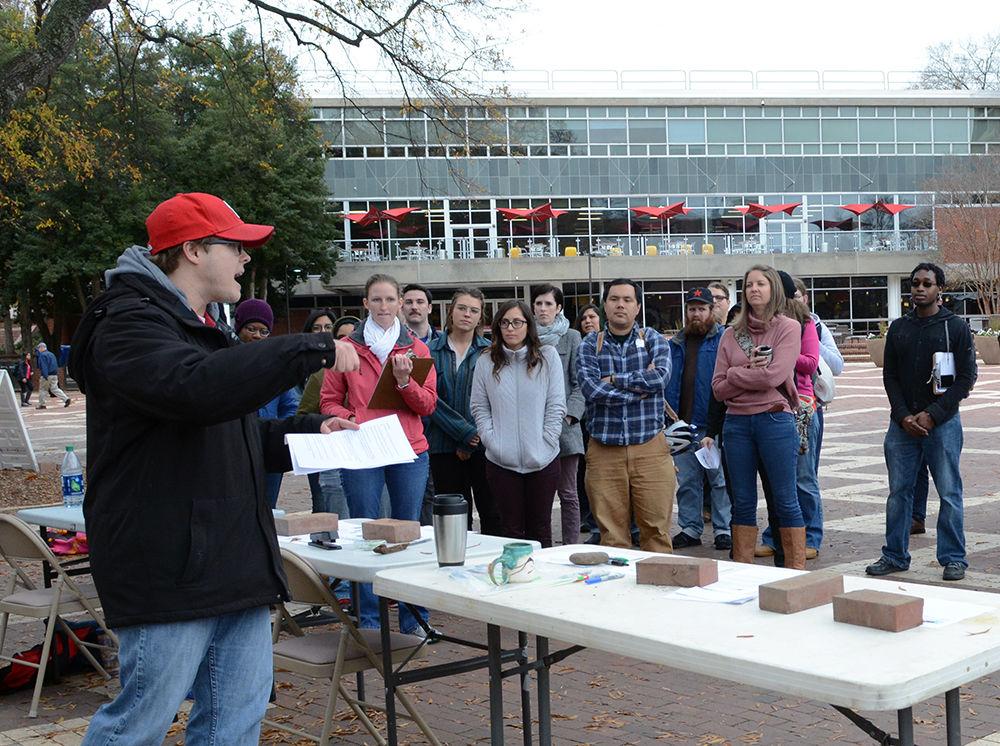Graduate and undergraduate students, along with other members of the college community gathered in the Brickyard on Wednesday to protest the Tax Cuts and Jobs Act and reach out to NC State students about the bill.
The protest, organized by NC State graduate students, featured speakers from NC State and the surrounding community to inform people about the negative impacts the bill could have on higher education, specifically graduate, part-time, and non-traditional students. Organizers also encouraged students to sign the petition created to protest the bill and call North Carolina Sens. Thom Tillis and Richard Burr to express their concerns.
The bill, also referred to as H.R.1, was introduced in the U.S. House of Representatives on Nov. 2 and passed its reading in the U.S. Senate on Dec. 2. H.R.1 is currently being reviewed in the House with an amendment added by the Senate.
“We’re trying to get graduate students to organize and inform themselves about these policies that are being had in the federal legislature that can have a really negative impact on higher education,” said Andrew Smolski, a graduate student studying sociology and one of the organizers of the protest. “For instance, the House bill contains a tax on graduates’ income waivers which are huge for all of us. They account for about $9,000 extra of income.”
Another negative impact described by Smolski is the removal of the student loan deduction in the bill.*
“The student loan interest deduction is huge for everybody,” Smolski said. “It amounts to about $2,500 that you can write off on your tax bill. Most students nowadays are here on student loans and when you take that away, even if you say cut their income bracket down a little bit, that’s still $2,500 they’re no longer allowed to assess, which is why that could lead to increased tax bills for them.”
The protest was also heavily attended by undergraduate students who plan on pursuing higher education through graduate school. Markus Koeneke, a fifth-year studying environmental technology and management, described how he would be impacted by the tax bill.
“I worked in a lab with a bunch of graduate students,” Koeneke said. “I’ve been paying attention to the news and I’m going to be going to grad school in about a year. This is an issue that’s really going to be impacting me throughout my studies. I’d like to pursue higher education, so this would probably make me go into more student debt in order to get the degrees I want.”
H.R.1 proposes a tax cut of approximately $1.5 trillion that would benefit businesses and high-income households. However, the bill includes certain provisions that would increase taxes paid on college tuition for students.
Maia Fitzstevens, a graduate student studying soil science and an organizer of the event, described how provisions in the bill would include tuition waivers as taxable income.
“This will make our tuition waivers, which make graduate education affordable for all of us, count as taxable income, which would mean that of our meager stipends that we already can barely live off of, it would make it so that we basically can’t afford to live as graduate students and we have to make different choices about what we’re doing in life other than pursuing graduate education,” Fitzstevens said.
Fitzstevens discussed how protests are happening throughout the country in response to H.R.1.
“I was inspired by the national movement called Save Grad Ed that organized a walkout last Wednesday on campuses around the country,” Fitzstevens said. “It is a national movement so I saw that and then I learned that nothing was happening at NC State and I decided that we should do something and raise our voices, especially since we’re a red state.”
While the protest mainly focused on how the tax bill will largely affect graduate, part-time, and non-traditional students, Smolski described why all students should understand the impact it could have.
“If you tax graduate students and there’s less graduate students, they’re going to see larger hauls, less quality teaching because teachers will be overworked and generally just the reduction in the quality of their education,” Smolski said. “On top of that, if they reduce public revenue that means reduce public investment, which means increased tuition. So across the board for undergraduates just as much as for graduates students, it’s a matter of economics. They’re coming for our education and to make it less affordable.”
The organizers plan to hand-deliver the signed petitions to the Senator offices in the upcoming weeks.
“This is just the beginning,” Fitzstevens said. “We need to keep up the fight and keep organizing as students and not let our academic silos keep us separate and disconnected from each other.”
*Editor’s note: This article was updated on Dec. 6.








